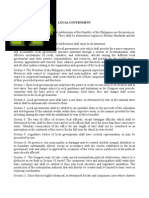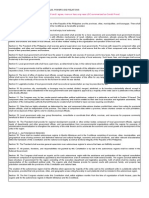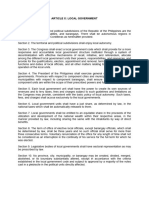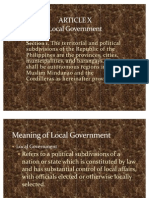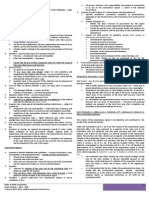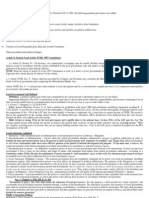0 ratings0% found this document useful (0 votes)
112 views1987 Constitution - Article X: Local Government
1987 Constitution - Article X: Local Government
Uploaded by
Gilbert MalcolmThis document outlines key provisions for local governments in the 1987 Philippine Constitution. It establishes provinces, cities, municipalities, and barangays as the territorial and political subdivisions. It provides for local autonomy and decentralization through mechanisms like recall, initiative, and referendum. The President exercises general supervision over local governments, while ensuring acts of component units are within their prescribed powers. Local governments have their own revenue sources and can levy taxes subject to guidelines. They also receive an automatic share of national taxes. Elective local officials serve three-year terms with a limit of three consecutive terms. Changes to local governments require approval in affected areas.
Copyright:
© All Rights Reserved
Available Formats
Download as DOCX, PDF, TXT or read online from Scribd
1987 Constitution - Article X: Local Government
1987 Constitution - Article X: Local Government
Uploaded by
Gilbert Malcolm0 ratings0% found this document useful (0 votes)
112 views2 pagesThis document outlines key provisions for local governments in the 1987 Philippine Constitution. It establishes provinces, cities, municipalities, and barangays as the territorial and political subdivisions. It provides for local autonomy and decentralization through mechanisms like recall, initiative, and referendum. The President exercises general supervision over local governments, while ensuring acts of component units are within their prescribed powers. Local governments have their own revenue sources and can levy taxes subject to guidelines. They also receive an automatic share of national taxes. Elective local officials serve three-year terms with a limit of three consecutive terms. Changes to local governments require approval in affected areas.
Original Description:
sss
Original Title
1987 Constitution
Copyright
© © All Rights Reserved
Available Formats
DOCX, PDF, TXT or read online from Scribd
Share this document
Did you find this document useful?
Is this content inappropriate?
This document outlines key provisions for local governments in the 1987 Philippine Constitution. It establishes provinces, cities, municipalities, and barangays as the territorial and political subdivisions. It provides for local autonomy and decentralization through mechanisms like recall, initiative, and referendum. The President exercises general supervision over local governments, while ensuring acts of component units are within their prescribed powers. Local governments have their own revenue sources and can levy taxes subject to guidelines. They also receive an automatic share of national taxes. Elective local officials serve three-year terms with a limit of three consecutive terms. Changes to local governments require approval in affected areas.
Copyright:
© All Rights Reserved
Available Formats
Download as DOCX, PDF, TXT or read online from Scribd
Download as docx, pdf, or txt
0 ratings0% found this document useful (0 votes)
112 views2 pages1987 Constitution - Article X: Local Government
1987 Constitution - Article X: Local Government
Uploaded by
Gilbert MalcolmThis document outlines key provisions for local governments in the 1987 Philippine Constitution. It establishes provinces, cities, municipalities, and barangays as the territorial and political subdivisions. It provides for local autonomy and decentralization through mechanisms like recall, initiative, and referendum. The President exercises general supervision over local governments, while ensuring acts of component units are within their prescribed powers. Local governments have their own revenue sources and can levy taxes subject to guidelines. They also receive an automatic share of national taxes. Elective local officials serve three-year terms with a limit of three consecutive terms. Changes to local governments require approval in affected areas.
Copyright:
© All Rights Reserved
Available Formats
Download as DOCX, PDF, TXT or read online from Scribd
Download as docx, pdf, or txt
You are on page 1of 2
1987 Constitution - Article X
Approved: 02 February 1987
LOCAL GOVERNMENT
GENERAL PROVISIONS
Section 1. The territorial and political subdivisions of the Republic
of the Philippines are the provinces, cities, municipalities, and
barangays. There shall be autonomous regions in Muslim Mindanao
and the Cordilleras as hereinafter provided.
Section 2. The territorial and political subdivisions shall enjoy local
autonomy.
Section 3. The Congress shall enact a local government code which
shall provide for a more responsive and accountable local
government structure instituted through a system of
decentralization with effective mechanisms of recall, initiative, and
referendum xxxx.
Section 4. The President of the Philippines shall exercise general
supervision over local governments. Provinces with respect to
component cities and municipalities, and cities and municipalities
with respect to component barangays, shall ensure that the acts of
their component units are within the scope of their prescribed
powers and functions.
Section 5. Each local government unit shall have the power to
create its own sources of revenues and to levy taxes, fees and
charges subject to such guidelines and limitations as the Congress
may provide, consistent with the basic policy of local autonomy.
Such taxes, fees, and charges shall accrue exclusively to the local
governments.
Section 6. Local government units shall have a just share, as
determined by law, in the national taxes which shall be
automatically released to them.
Section 8. The term of office of elective local officials, except
barangay officials, which shall be determined by law, shall be three
years and no such official shall serve for more than three
consecutive terms. Voluntary renunciation of the office for any
length of time shall not be considered as an interruption in the
continuity of his service for the full term for which he was elected.
Section 10. No province, city, municipality, or barangay may be
created, divided, merged, abolished, or its boundary substantially
altered, except in accordance with the criteria established in the
local government code and subject to approval by a majority of the
votes cast in a plebiscite in the political units directly affected.
You might also like
- Presentation 1Document32 pagesPresentation 1Hiei TriggerNo ratings yet
- Article X 1987 ConstiDocument8 pagesArticle X 1987 ConstiMyles LaboriaNo ratings yet
- Pubcorp Summer 2016 1987 Constitution Art 10 ApreloxDocument3 pagesPubcorp Summer 2016 1987 Constitution Art 10 ApreloxAlvinReloxNo ratings yet
- LG ReviewerDocument68 pagesLG Reviewercmv mendozaNo ratings yet
- Local Government CodeDocument1 pageLocal Government CodeSapphireNo ratings yet
- 101522Document59 pages101522Cath VillarinNo ratings yet
- Local GovernmentDocument8 pagesLocal Governmentcherrymea.bendicio-21No ratings yet
- Article X of The ConstitutionDocument3 pagesArticle X of The ConstitutionJudiel Pareja100% (1)
- Article XDocument3 pagesArticle XKylie July100% (1)
- 1987 Constitution Article X Local GovernmentDocument4 pages1987 Constitution Article X Local Governmentblackmail1No ratings yet
- Aliana Marie N. Tangan Bsa - 1 YrDocument39 pagesAliana Marie N. Tangan Bsa - 1 YrDyanne Oclarit PagaraoNo ratings yet
- Article 10 of The 1987 Philippine ConstitutionDocument3 pagesArticle 10 of The 1987 Philippine ConstitutionNephtali Perez0% (1)
- LGUDocument3 pagesLGUPoppy CornNo ratings yet
- 26sept - Loc GovDocument9 pages26sept - Loc GovYvonne DolorosaNo ratings yet
- Company Non-Governmental Organizations Shareholders Stock Shares Stock MarketDocument11 pagesCompany Non-Governmental Organizations Shareholders Stock Shares Stock MarketPerry YapNo ratings yet
- Locgov ReviewerDocument377 pagesLocgov ReviewerAlexis Elaine BeaNo ratings yet
- Pubcorp 2 DigestDocument12 pagesPubcorp 2 DigestasdfghjkattNo ratings yet
- Consolidated Exam PointersDocument75 pagesConsolidated Exam Pointersdave bermilNo ratings yet
- Republic v. City of Davao, G.R. No. 148622, September 12, 2002Document12 pagesRepublic v. City of Davao, G.R. No. 148622, September 12, 2002Marvin De LeonNo ratings yet
- ARTICLE X Local GovernmentDocument42 pagesARTICLE X Local Governmentnlepasana41570% (23)
- LocalGovernmentDocument23 pagesLocalGovernmentPhilharmonic TotohNo ratings yet
- Second Reading Assignment B. Local Government Units 1. Types of Lgus Reference: Article X, 1987 Philippine ConstitutionDocument13 pagesSecond Reading Assignment B. Local Government Units 1. Types of Lgus Reference: Article X, 1987 Philippine Constitutionstephanie linajaNo ratings yet
- The 1987 Constitution of The Republic of The Philippines - Article XDocument5 pagesThe 1987 Constitution of The Republic of The Philippines - Article XNorvie GatdulaNo ratings yet
- Article X Local GovernmentDocument3 pagesArticle X Local GovernmentANGIELYN BASILANNo ratings yet
- LocGov Codal Nov 22Document3 pagesLocGov Codal Nov 22Chalo GarciaNo ratings yet
- The Territorial and Political Subdivisions of The Republic of The Philippines Are The Provinces, Cities, Municipalities, and BarangaysDocument85 pagesThe Territorial and Political Subdivisions of The Republic of The Philippines Are The Provinces, Cities, Municipalities, and BarangaysIan TulodNo ratings yet
- General Provisions: Article XDocument4 pagesGeneral Provisions: Article XJulrey GarciaNo ratings yet
- Ilo 3 - Document Analysis (Asl)Document11 pagesIlo 3 - Document Analysis (Asl)Gladys LaconicoNo ratings yet
- ARTICLE X (Text Version)Document19 pagesARTICLE X (Text Version)Aislinn Agodon100% (1)
- Pub Corp NotesDocument45 pagesPub Corp NotesSherine Lagmay RivadNo ratings yet
- Autonomous Region in Muslim MindanaoDocument31 pagesAutonomous Region in Muslim MindanaoRenerio de Dios JrNo ratings yet
- ART-10-LOCAL-GOVT Consti LawDocument8 pagesART-10-LOCAL-GOVT Consti LawAnonymous JVD8bLSxNo ratings yet
- Local Government Code 1991Document199 pagesLocal Government Code 1991Edison FloresNo ratings yet
- MMA Act 25Document226 pagesMMA Act 25sherhankNo ratings yet
- Basis For Local GovernanceDocument4 pagesBasis For Local GovernanceBernadette LlanetaNo ratings yet
- SECTION 4. Scope of Application. - This CodeDocument3 pagesSECTION 4. Scope of Application. - This Codethornapple25No ratings yet
- RA 8553 RA 8553: Be It Enacted by The Senate and House of Representatives of The Philippines in Congress AssembledDocument5 pagesRA 8553 RA 8553: Be It Enacted by The Senate and House of Representatives of The Philippines in Congress AssembledPau JoyosaNo ratings yet
- General Provisions: Article X Local GovernmentDocument10 pagesGeneral Provisions: Article X Local GovernmentAL Babaran CanceranNo ratings yet
- Dumogho LGC Relevant ProvisionsDocument9 pagesDumogho LGC Relevant ProvisionsRoseMantuparNo ratings yet
- Special Laws LocGOVDocument65 pagesSpecial Laws LocGOVJerome MoradaNo ratings yet
- Locgov Case Doctrines Part 20Document14 pagesLocgov Case Doctrines Part 20Sandra MagalangNo ratings yet
- Book 1Document61 pagesBook 1Elinor DashwoodNo ratings yet
- Pubcorp Monday 3:30-6:30 June 6, 2016 Lecture and Questions Operating Provisions (Essay Atleast 3 Ecological Balance) (Laudato Sy)Document16 pagesPubcorp Monday 3:30-6:30 June 6, 2016 Lecture and Questions Operating Provisions (Essay Atleast 3 Ecological Balance) (Laudato Sy)Chezca MargretNo ratings yet
- An Act Providing For A Local Government Code of 1991Document44 pagesAn Act Providing For A Local Government Code of 1991Tay Wasnot TusNo ratings yet
- ARTICLE X. Local Government General Provisions Section 1. Units of Local GovernmentDocument14 pagesARTICLE X. Local Government General Provisions Section 1. Units of Local GovernmentAndrea RioNo ratings yet
- Lecture Dilg April 5 2021Document119 pagesLecture Dilg April 5 2021keith tanuecoNo ratings yet
- Article X Local GovernmentDocument3 pagesArticle X Local GovernmentMiguel Satuito0% (1)
- LGC Pubcorp 01222015Document5 pagesLGC Pubcorp 01222015Lalisse MoragaNo ratings yet
- RA 7160 Local Government CodeDocument195 pagesRA 7160 Local Government CodeStewart Paul Tolosa Torre100% (1)
- Local Government - Their FinancingDocument15 pagesLocal Government - Their FinancingHenry M. Macatuno Jr.100% (2)
- Pub Corp Reviewer SummarizedDocument16 pagesPub Corp Reviewer SummarizedBudoyNo ratings yet
- RA 8553 RA 8553: Be It Enacted by The Senate and House of Representatives of The Philippines in Congress AssembledDocument36 pagesRA 8553 RA 8553: Be It Enacted by The Senate and House of Representatives of The Philippines in Congress AssembledPatrickBernalNo ratings yet
- Pa 207 PointersDocument3 pagesPa 207 PointersAngel FlordelizaNo ratings yet
- The Local Government CodeDocument46 pagesThe Local Government Codeanna578_omie100% (1)
- RA 7160 Local Government CodeDocument308 pagesRA 7160 Local Government CodeJem B. Panganiban100% (1)
- Summary of The Local Government Code of 1991Document2 pagesSummary of The Local Government Code of 1991Saidamen R. Mambayao100% (2)
- LAWDocument3 pagesLAWJordan ChummaniNo ratings yet

